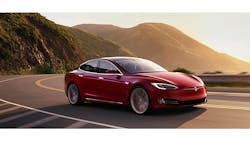In another setback for the high-flying electric carmaker, Tesla's Model S once again fell short of the top rating in a key crash test, an independent testing agency said on July 6.
On the eve of seeing its first mass-market Model 3 roll off the assembly line, the Insurance Institute for Highway Safety said that despite changes made to the vehicles produced after January, the Model S was again only able to attain an acceptable rating in the small-overlap test conducted in February. That test mimics a car hitting a tree or a pole.
As a result, Tesla failed to achieve the IIHS Top Safety Pick rating, which requires a "good" rating in all five of its crash test scenarios. Carmakers often request a retest if they fall short of the highest rating the first time.
IIHS said the Model S in both tests fell short of the top rating because the safety belt did not sufficiently restrain the driver in the crash.
"The main problem with the performance of the Model S was that the safety belt let the dummy's torso move too far forward, allowing the dummy's head to strike the steering wheel hard through the airbag," the statement said.
The vehicle also had some structural issues in the second crash test, IIHS said.
A Tesla spokesperson defended the vehicle's safety rating, noting it had achieved the highest rating in the other four IIHS crash categories, and testing by the government's National Highway Traffic Safety Administration (NHTSA) gave the car the top rating across the board.
However, NHTSA does different tests than the IIHS and does not have a comparable small overlap test. IIHS, which is funded by the insurance industry, and NHTSA, a federal agency, are the only organizations in the United States that conduct crash tests.
The government tests "found Model S and Model X to be the two cars with the lowest probability of injury of any cars that it has ever tested, making them the safest cars in history," the spokesperson said in a statement, adding that insurance companies charge five percent less to insure Tesla vehicles compared to comparable models.
Tesla in April recalled 53,000 vehicles to address a manufacturing defect that could prevent the parking brake from releasing, but there were no reports of injuries or accidents related to the issue.
The company also was investigated for a fatal crash in May 2016 involving a driver of a Model S using the Tesla's autopilot feature. But investigators found the driver was warned repeatedly for not keeping his hands on the steering wheel, and no safety defect was found.
The company's share price slumped 7.2 percent Wednesday after Goldman Sachs slashed its price target on the carmaker due to the expected slowdown in deliveries, despite the announcement Monday that production of the $35,000 Model 3 would ramp up quickly, with the first deliveries July 28.
Copyright Agence France-Presse, 2017
About the Author
Bloomberg
Licensed content from Bloomberg, copyright 2016.
